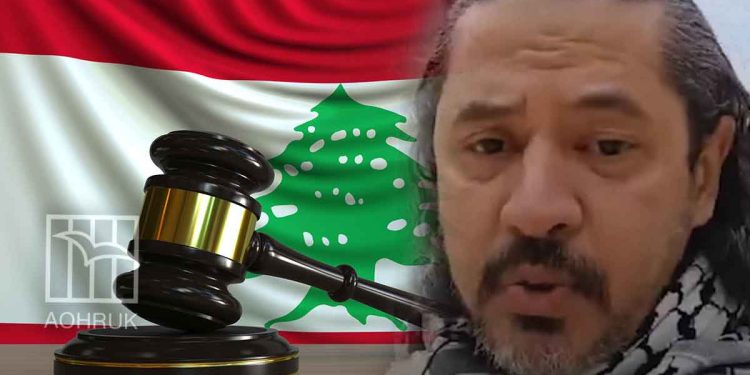Arab Organisation for Human Rights in the UK (AOHR UK) said that the recommendation of the Public Prosecution to the Lebanese Parliament to extradite opposition figure Abdel Rahman Al-Qaradawi to the UAE is a purely political decision, that violates Lebanese and international laws which prohibit the extradition of political opponents to places where their lives would be in danger or might be subjected to torture.
AOHR UK stated that the UAE’s memorandum to extradite Al-Qaradawi was based on posts he had published on social media during his visit to Syria, in which he expressed his free opinion on the current events, without any kind of incitement to the commission of any crime, adding that his posts were in line with the freedom of expression guaranteed by Lebanese and international domestic laws.
AOHR UK pointed out that the Egyptian memorandum requesting the extradition of Al-Qaradawi was based on an in absentia ruling against him issued by an Egyptian court. This case was also based on Al-Qaradawi using his right to express his opinion freely on the events in Egypt, however the Egyptian authorities, as it usually does, considered it a criminal offence that is inciting to violence and terrorism. The Egyptian regime is known for fabricating charges against many opponents, both at home and abroad.
AOHR UK pointed out that the Public Prosecutor Jamal Al-Hajjar, the recommendation maker, ignored several facts deliberately, which confirm that his decision is purely political; the most important of which is that Abdel Rahman Al-Qaradawi is a political opponent and a famous poet who expresses his opinion on various events in the Arab world, which does not constitute a crime according to Lebanese laws. The Public Prosecutor also ignored the fact that the laws in both countries legitimise enforced disappearance and deprive the targeted individual of all his rights. Moreover, the Public Prosecutor ignored the fact that torture is widespread in both countries, which has claimed the lives of hundreds of victims, especially in Egypt, as they died under torture.
AOHR UK emphasised that the Lebanese Public Prosecutor is fully aware that the Emirati regime does not enjoy an independent judiciary system, and that the UAE regime deals brutally with political opponents and even the ordinary residents. Therefore, it is necessary to remind the Public Prosecutor and Lebanese politicians of the killing of the Lebanese expatriate Ghazi Ezz El-Din, 55, in Abu Dhabi prisons under torture. Ezz El-Din was arrested in mid-March 2023, and his death was announced on May 4,2023, less than two months after this arrest. He was buried at night in Abu Dhabi without anyone being allowed to examine his body.
AOHR UK also recalled the mafia methods used by the UAE regime to pursue opponents outside its borders in case of failure to extradite them through a transparent legal process. One of these cases is the kidnapping of opposition figure Abdel Rahman Al-Suwaidi from Indonesia in 2015 in collusion with officers, after an Indonesian court refused to extradite him. He disappeared and was sentenced to 15 years in prison, and then he suddenly appeared on an Emirati government TV channel in May 2017 with a story he was forced to tell. He was pardoned in 2019 and has not appeared ever since. The same happened with Dr. Khalaf Al-Rumaithi, who was kidnapped from the Jordanian capital, Amman, and handed over to the UAE following cooperation at the political and security level, after a Jordanian court refused to extradite him. Since his kidnapping, he has disappeared completely and his fate remains unknown.
AOHR UK stressed that there are legitimate concerns over Al-Qaradawi’s fate in light of the double standards played by the Lebanese authorities in dealing with other files due to political pressure. This is apparent as the Lebanese authorities have turned a blind eye to Syrian officers who committed crimes against humanity and sought refuge in Lebanon after the collapse of the Assad regime, and recently allowed Rifaat Al-Assad, who is wanted by a Swiss court, to travel via Hariri Airport. Ironically, his destination was the UAE, which has received many Syrian figures accused of committing crimes.
AOHR UK warned the Lebanese authorities against handing over Al-Qaradawi to the UAE or Egypt, as this would mean sentencing him to death, which would implicate Lebanese officials, most notably the public prosecutor, in participating in serious crimes that expose them to prosecution and accountability at the international level.
AOHR UK called on the Secretary-General of the United Nations and the Working Group on Torture and Enforced Disappearances to closely follow up on Al-Qaradawi’s case to prevent any devious attempts to hand him over. It also called on the Turkish government, of which Al-Qaradawi holds citizenship, to pressure the Lebanese government to prevent his extradition and release him immediately.



























